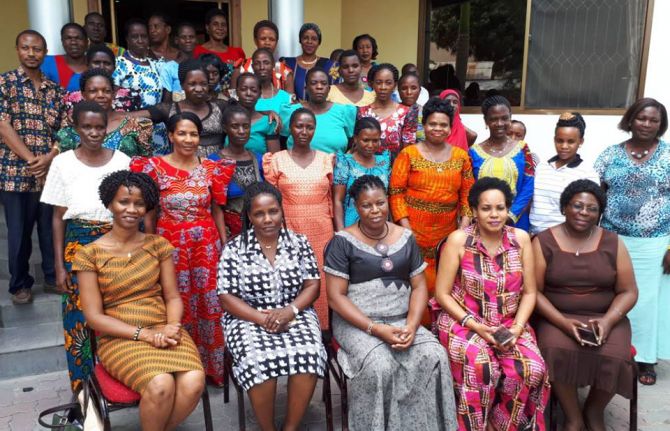

Feature Story
A champion for screening and treating cervical cancer among women living with HIV
08 February 2018
08 February 2018 08 February 2018Basilisa Ndonde has a big smile on her face as she walks into her office at Tanzania Health Promotion Support, a civil society organization. It is a special day for her—World Cancer Day, commemorated on 4 February each year. Ms Ndonde is at the forefront of the response to cancer on the ground, coordinating the Afya Jali project to raise awareness about, and uptake of, cervical and breast cancer services among women living with HIV.
Women living with HIV are four to five times more likely to develop cervical cancer than women who are HIV-negative. HIV weakens the immune system and reduces the body’s ability to fight opportunistic infections, such as the human papillomavirus (HPV), which causes 70% of cervical cancer cases.
The United Republic of Tanzania has the sixth highest incidence of cervical cancer in the world and has 1.4 million people living with HIV.
Ms Ndonde is proud of the achievements of the Afya Jali (which means “Taking care of your health” in Swahili) project so far, just a few months after its inception. In collaboration with the Ministry of Health, Community Development, Gender, Elderly and Children and the Tanzania network of women living with HIV, Ms Ndonde has facilitated the development of resource materials for health and community workers to sensitize women on the need to be screened for cervical and breast cancer. “For the first time in the country, we now have comprehensive guidelines for health workers on the prevention, screening and treatment of the cancers of reproductive organs,” she says.
Ms Ndonde has obtained the support of local government authorities in all four regions in which the project has been implemented. She has also organized a training of trainers workshop in the same regions for 30 women living with HIV, who sensitize other women on cervical and breast cancer and encourage cancer disclosure to mitigate stigma. “Each participant had to practice and demonstrate in front of the workshop’s audience that they know how to deliver the messages back to their respective communities,” says Ms Ndonde.
The project is funded by UNAIDS as part of the Pink Ribbon Red Ribbon (PRRR) initiative, a global partnership of governments, nongovernmental and multilateral organizations, foundations and corporations with a shared goal of reducing deaths from cervical cancer and breast cancer in low- and middle-income countries. PRRR’s mission in the United Republic of Tanzania is to build on existing health-care programmes to integrate cervical cancer prevention, screening and treatment and breast cancer services and to increase access to HPV vaccination.
UNAIDS is working with countries to achieve the commitment made by counties at the United Nations High-Level Meeting on Ending AIDS in 2016 to take AIDS out of isolation through people-centred systems to improve universal health coverage, including treatment for tuberculosis, cervical cancer and hepatitis B and C.



